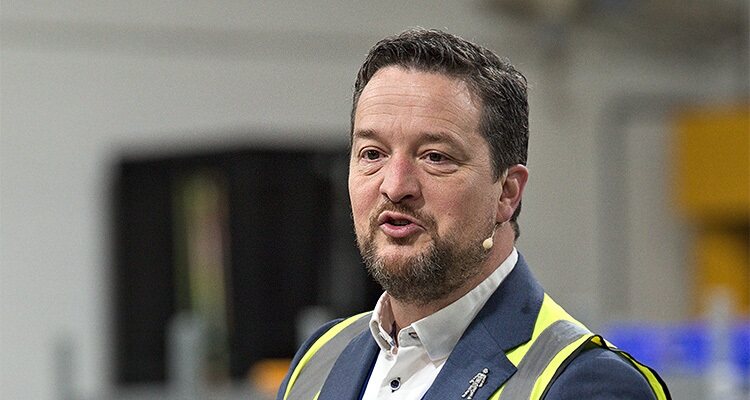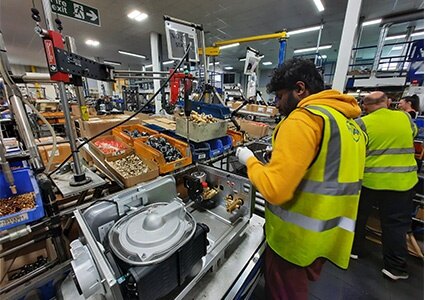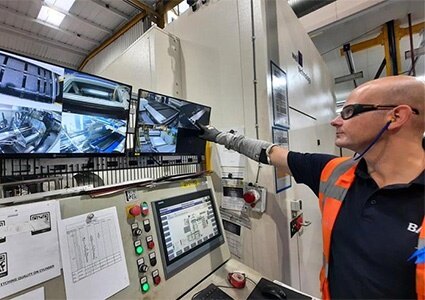
Baxi’s Pioneering Steps Towards Zero-Carbon Heat
With a portfolio featuring some of the most renowned and respected brands in the heating industry, Baxi Ltd is a prominent player in the European market. As one of the largest manufacturers and distributors of heating systems, Baxi benefits from a strong research and development platform and the financial backing of the BDR Thermea Group (BDR), to which the company belongs. This financial support enables Baxi to make considerable capital investment, ensuring it stays at the pinnacle of innovation. Since its inception in Lancashire in 1866, the company has made significant strides from its manufacturing site in Preston, by designing products that pave the way towards a zero-carbon future. Jan Rijnen, Managing Director, sheds light on Baxi’s endeavors and accomplishments over the past three years.
 “At BDR, our focus has mostly been on advancing the energy transition for heating by assessing our manufacturing footprint, the countries we serve, our competencies and areas where we may lack expertise. We have also done a lot of acquisitions around heat pump technologies and heat networks as we seek to develop our expertise in those areas. Moreover, we have made significant progress in modularizing our products. For example, we now have a global platform of boilers that allows for tailored local solutions. So, while we offer a distinct product for the UK market, our Italian, Spanish, and Dutch boilers are also derived from the same platform, customized to meet the specific requirements, needs, and preferences of each respective country. Throughout the pandemic, our supply chain faced some challenges with sourcing materials. However, due to our global approach to supply chain setup, we’ve done much better than other companies in terms of fuel sourcing and platform management during that period. Regarding our operations in the UK, we have made significant efforts to merge the businesses we acquired into our organization. As part of that, we have centralized our sales, production, and supply chain activities at our Preston site,” he reveals.
“At BDR, our focus has mostly been on advancing the energy transition for heating by assessing our manufacturing footprint, the countries we serve, our competencies and areas where we may lack expertise. We have also done a lot of acquisitions around heat pump technologies and heat networks as we seek to develop our expertise in those areas. Moreover, we have made significant progress in modularizing our products. For example, we now have a global platform of boilers that allows for tailored local solutions. So, while we offer a distinct product for the UK market, our Italian, Spanish, and Dutch boilers are also derived from the same platform, customized to meet the specific requirements, needs, and preferences of each respective country. Throughout the pandemic, our supply chain faced some challenges with sourcing materials. However, due to our global approach to supply chain setup, we’ve done much better than other companies in terms of fuel sourcing and platform management during that period. Regarding our operations in the UK, we have made significant efforts to merge the businesses we acquired into our organization. As part of that, we have centralized our sales, production, and supply chain activities at our Preston site,” he reveals.
Hydrogen heat
Building a greener future being Baxi’s core mission, Jan discusses the implications of the UK Government’s energy transition agenda on the company’s operations. “The government’s agenda aligns with the expectations we hold due to our strong presence in European countries. Similar discussions and local perspectives on subsidiary management and market transformation are prevalent in Germany, the Netherlands, and Italy. We can offer many efficient solutions across those countries and are currently discussing heat networks, heat pumps, hybrid systems, and hydrogen. But what remains for us to do is to bring that discussion into the UK to understand what the market here requires and what fits the government’s ambition, which overlaps with our view on the future. While we have been predominantly manufacturing boilers for the last decade, we firmly believe that markets worldwide will transition towards a multi-technology landscape. Naturally, the question arises regarding the replacement of gas boilers. There is no single perfect solution that will replicate exactly what gas boilers have done for us in the past four decades. As a result, there will probably be some gas boilers remaining but also some hydrogen and hybrid boilers, as well as heat pumps and heat networks. Baxi is well-equipped to support and provide all these solutions. Nonetheless, we must assess which one will fit the UK Government’s ambitions and the requirements of the UK market. The ambitions for decarbonization align closely with our goals. Presently, our focus is on leveraging our group’s diverse portfolio to develop solutions tailored specifically to the UK market,” he explains.
Baxi is indeed well-equipped to provide alternative heating solutions to the UK market, once it is ready to move away from gas boilers. “In the UK, the gas boiler market remains substantial whereas heat pumps represent a small fraction of the market. Similarly, the adoption of heat networks is still in its early stages. For these reasons, we predominantly focus on building gas boilers and cylinders. We expect the demand for our gas boilers to reduce in the coming years, albeit very slowly, whilst production for our stainless-steel cylinders will grow along with the heat pump market. All in all, we are fully prepared to serve the UK market if heat networks, and heat interface units become more prevalent here. We would then set up a production line for each interface unit, using one of the existing boiler lines as the demand for boilers decreases. Likewise, we have already implemented a production line for hydrogen boilers within BDR, which is fully installed and running. But for the moment, opening a second production line globally for those is not economically viable due to the lack of demand,” Jan highlights.
Before demand picks up for hydrogen boilers and they become widely adopted – and in the UK, the government isn’t expected to make a decision on the role of hydrogen for residential heating until 2026 – Jan clarifies that hydrogen presents some challenges that must be addressed first. “Converting a natural gas boiler into a hydrogen boiler is no simple task as hydrogen burns at higher temperatures and requires modifications such as an extra burner and a flame detection system due to hydrogen flames being almost invisible. Sourcing hydrogen also requires the implementation of a separate gas block. Nevertheless, these challenges are not unsurmountable as we and some of our competitors have already developed a very well-functioning hydrogen boiler. Therefore, from a technical standpoint, there are no significant challenges. The real issues lie in the value chain. Firstly, it only makes sense to work with hydrogen if the aim is to utilize green hydrogen. Having enough green hydrogen available at an acceptable cost will be quite challenging. Then, there is the issue of convincing homeowners to use hydrogen in their homes instead of natural gas. Baxi is involved in the important H100 live trial in Scotland with gas network, SGN, which has been designed to test the social acceptability and performance of hydrogen in a real home setting. SGN and other gas networks still have some work to do to make the gas grid fully compatible with hydrogen, should the government decide to repurpose some or all of the grid once fossil fuels have been phased out in homes.”
With its industry-leading portfolio and focus on building a zero-carbon future, Baxi is poised to strengthen its prominent position in heating solutions for the foreseeable future.